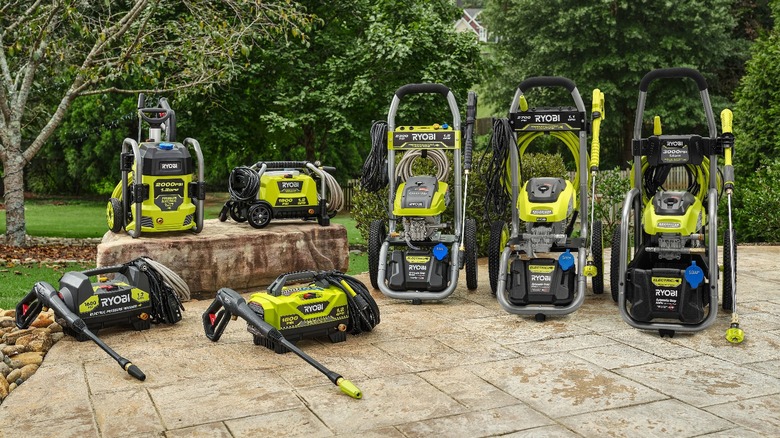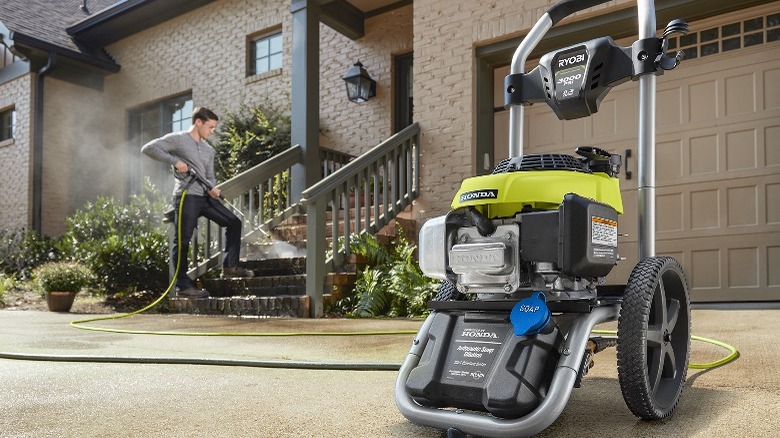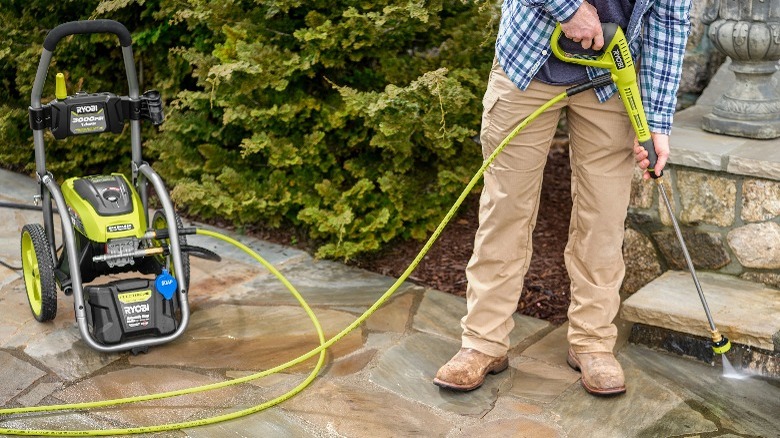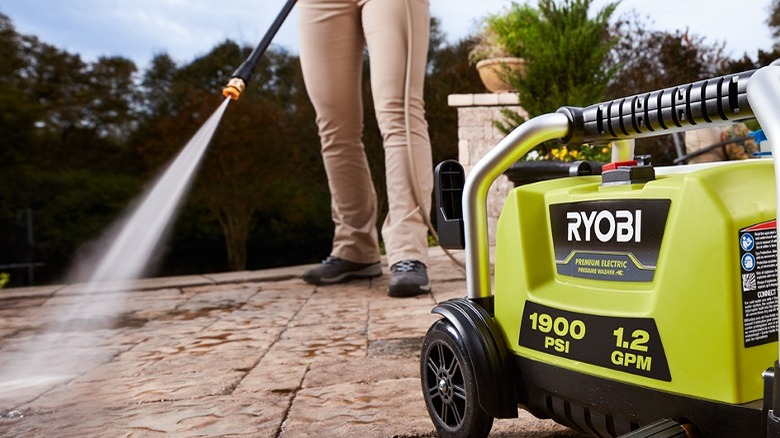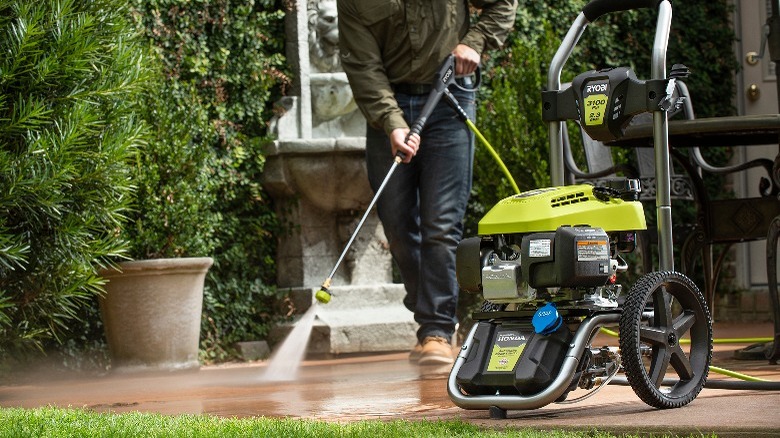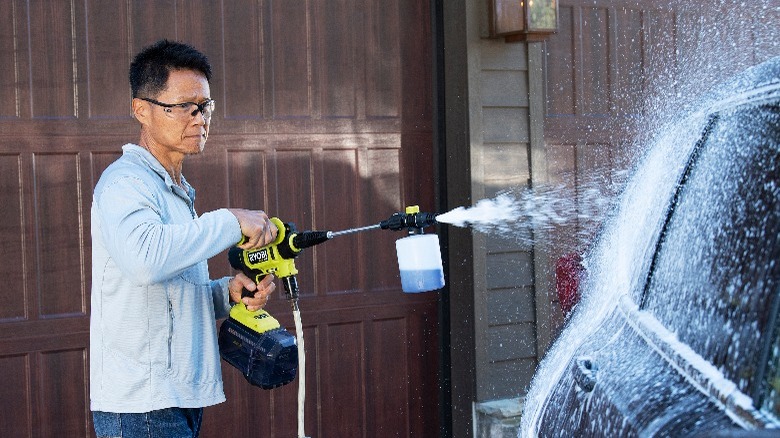Ryobi Gas Vs. Electric Pressure Washer: Which Type Is Best For Your Needs?
Electric power tools have come a long way in recent years, which is why you're starting to see more and more of them crop up on the shelves of your local Home Depot. Pressure washers are no exception. There are plenty of both gas and electric-powered options available for those who need them. In fact, the Home Depot associate store brand, Ryobi, is considered one of the best major pressure washer brands on the market. It makes over a dozen different models. I've purchased one of these pressure washers myself, so I know how overwhelming it can feel to stand in the aisle, staring at the wide range of prices, pressure capacities, and features that are on offer.
There are several factors that you need to consider when choosing a pressure washer, and you might be wondering whether a gas or electric-powered unit is more suited to your needs. While the overall purpose of all pressure washers is roughly the same, there are advantages to each of these power systems that might make one of them more convenient for your specific needs. There are a lot of Ryobi tools that every home landscaper will want, but overall, electric washers are better for casual use, while gas washers are more appropriate for heavy-duty tasks.
Gas tends to be more powerful
One of the first things that you're going to need to figure out is how much power you need. There are two measurements for this: PSI and GPM. PSI stands for pounds per square inch, and it measures pressure. It's the same unit that you use to measure the air pressure in your tires, only in this case, it's measuring the pressure that the water is placed under before it exits the pressure washer's wand. Higher pressure means more speed, more force, and more blasting power on your cleaning projects. GPM stands for gallons per minute. This is less about pressure and more about volume. It measures the amount of water that exits the wand each minute. This is actually more important in terms of the washer's overall rinsing power.
There are exceptions, but Ryobi's gas-powered units tend to offer higher PSI ratings and–perhaps more importantly–often offer more than double the GPM rating that you can get from their electric counterparts. This makes gas washers much better suited to heavy-duty jobs, like cleaning walkways and pavement. The most powerful pressure washer that Ryobi sells is the 3,300 PSI Honda GCV190 Gas Washer.
The flip side of this is that it's much less suited to more delicate jobs. You probably don't want to be cleaning windows at over 3,000 PSI, and you might also find yourself accidentally stripping the paint from decks and walls. I use a relatively mild 1,900 PSI 1.2 GPM Ryobi pressure washer, and even that can strip paint if I'm not careful.
Comparable electric units are more expensive
One of the biggest factors to take into account when purchasing any power tool is its price. All of the cheapest models that Ryobi has on the shelves are electric. This may lead you to believe that electric pressure washers are generally less expensive than their gas-powered counterparts. That isn't entirely accurate, however. All of the cheapest Ryobi pressure washers are also the least powerful models, offering the lowest PSI. There aren't any gas-powered pressure washers at these lower pressure ranges. As the PSI threshold rises on the electric models, so does the price. The gas-powered units are actually cheaper while offering greater performance than the electric ones once you start to get into the same PSI ranges.
For example, the Ryobi 2,900 PSI 2.5 GPM Cold Water Gas Pressure Washer is powered by a 212cc Engine and currently costs $299.00 at Home Depot. This is significantly more powerful than the Ryobi 2,500 PSI 1.2 GPM High-Performance Cold Water Electric Pressure Washer, which sells for the exact same price. There aren't a lot of perfect one-to-one comparisons in Ryobi's product range, but the overall trend of PSI and GPM-per-dollar tends to favor the gas-powered units.
Electric requires less maintenance
Gas-powered tools tend to be more powerful than their electric counterparts, but they also require significantly more upkeep, particularly when it comes to the fuel itself. A lot of people might not know that regular, untreated gasoline only lasts about three to six months before it starts to degrade. Old fuel doesn't just perform badly, either. It can leave buildups of water, carbon, gum, and other residues that can damage the internal components of the machine if left unchecked. This isn't usually a problem in cars, but it can cause a lot of problems in tools like pressure washers that typically only see seasonal use.Even with proper fuel maintenance, you might eventually start to see build-up in the carburetor or around the ignition system. This will need to be cleaned out, which can be a hassle.
Electric pressure washers require significantly less maintenance. You still probably don't want to leave water in the tank, as organic contaminants can grow in there over time, which can lead to clogs. This can be cleaned out with pump protector at the end of the season, but the electric motor requires little-to-no upkeep in order to properly function. I've been using mine for a couple of years now, and all I've ever had to do is refill the reservoir. This might not be as important as power for professional use-cases, but it's very convenient in a tool that you only take out of the shed once every few months.
Gas is cordless
One of the biggest drawbacks of electric systems is that most of them are tethered to extension cords. There are a few battery-operated hand-held wand units that don't need an extension cord, but these aren't particularly powerful. They can only output around 300-600 PSI. Every electric unit Ryobi makes that can produce over 1,000 PSI needs an extension cord.
This might not be a big deal if you're keeping close to the perimeter of your house, but having both a power outlet and a water spigot in close proximity to the area where you're working can be limiting on larger properties.
Say you have an extremely long driveway that you want to wash. You have water lines running to the end of the road, but you don't have electricity. You have two options: You can daisy-chain extension cords until you reach the area you're looking to clean (not recommended), or you can get a gas-powered unit that doesn't need to be plugged in.
Once again, this is the sort of thing that comes up for professionals a lot more often than personal users. It's a lot easier to clean a park walkway if you don't need to worry about power outlets.
Electric is quiet and doesn't produce fumes
Gas-powered pressure washers are quite loud. A little noise isn't the end of the world, but it can be annoying for you, family, neighbors, and it can even disrupt the local wildlife. Electric pressure washers aren't exactly quiet, but they operate at a much more manageable volume. Electric units usually put out 80 decibels, while gas washers can get up to 100 decibels. That's a 20% difference in noise pollution. Sound isn't the only kind of pollution caused by gas units, either. They also put out some nasty fumes.
Odds are that you're probably going to be using your pressure washer outside the vast majority of the time. That said, there are situations where you might need to clean out a garage or other indoor space and decide that a power washer is the best tool for the job. Gas-powered tools put off fumes that are toxic to breathe. This can be unpleasant enough outdoors, but it's actively unsafe to use them in a poorly ventilated indoor space. Electric units are much better in these situations as they don't produce any fumes.
